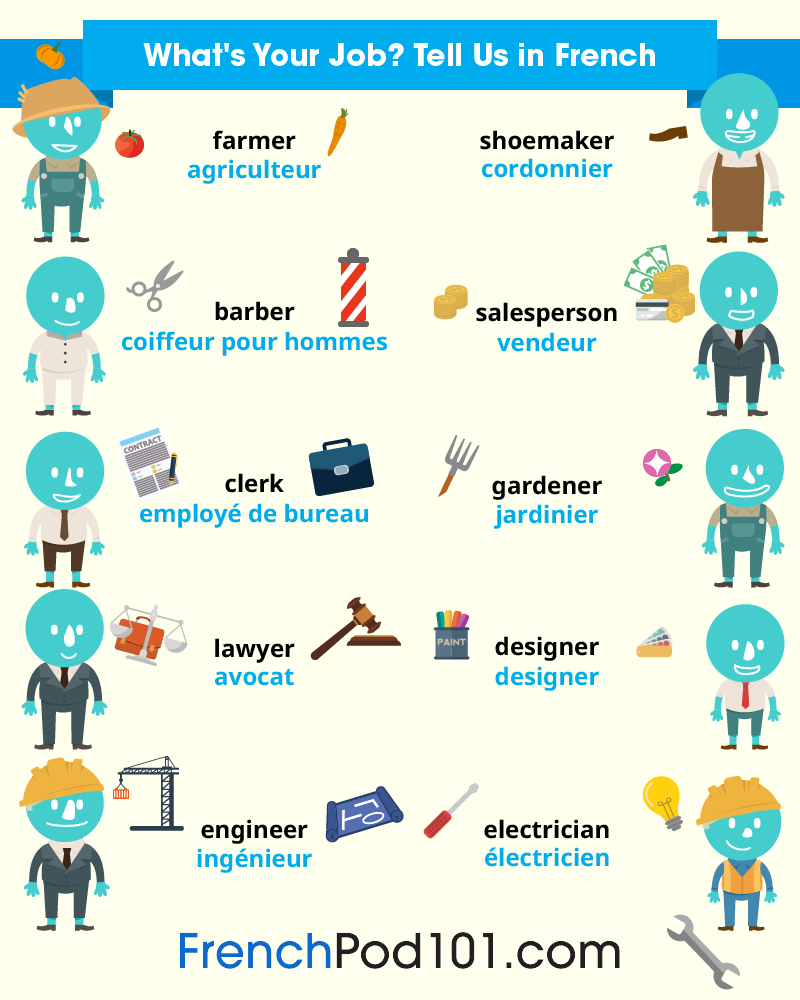Can you imagine going to a business meeting in France with no knowledge of business French? With a bit of reckoning and preparation, you can spare yourself a lot of embarrassment. All you need is a small set of business French phrases.
The world of work can be wildly different from one country to another, and when traveling somewhere for business—either permanently or as a visitor—you’ll have to quickly find your mark to make the best of your new business environment.
In this guide to phrases for doing business in French, you’ll learn everything you need to work in France or conduct your business with French-speaking partners. We’ll cover everything from coworkers and meetings to job interviews, letters, and even professional phone calls. Let’s take care of business!
 Table of Contents
Table of Contents
- Getting Started
- Business Words and Phrases
- Coworkers and Meetings
- Nail a Job Interview
- Emails and Letters
- Business Calls
- Le Mot De La Fin
1. Getting Started

Before we dive into specific business French phrases, let’s cover the basics and work on your first impressions.
In this section, you’ll learn how to greet, how formal you should be, and what words and expressions you need to know if you want to work or conduct business in French.
1 – Greetings and Goodbyes
- Bonjour (“Hello”) is the magic greeting that works for everybody at almost any time of day. Literally meaning “Good day,” it’s neither too formal nor too relaxed, so you really can’t go wrong with it.
- Bonsoir (“Good evening”) is basically bonjour for evening and night.
When meeting someone for the first time, you might want to add a polite “Nice to meet you.” Here are a few options:
- Enchanté(e). (“Delighted.”)
- This one can be used with anyone in any situation. It takes a final E in the feminine form.
- Ravi(e) de vous rencontrer. (“Happy to meet you.”)
- C’est un plaisir de vous rencontrer. (“It’s a pleasure to meet you.”)
- → To learn more about greetings and polite phrases, make sure to read our complete guide on How to Say Hello in French.
Saying goodbye is even more straightforward. In any formal situation, always stick with Au revoir (“Goodbye”), and nothing else. Then, only once you become more casual with coworkers or business partners, you could use the relaxed Salut (“Bye”) or a similar alternative.
- → You’ll find everything on saying “Goodbye” and “See you later” in our blog article on Saying Goodbye in French.
2 – “Tu” or “Vous”?
The French have two distinct pronouns for “you”: vous and tu (formal and casual “you”). Whenever in doubt, you can’t go wrong with vous.
A simple rule: Follow your partners’ or coworkers’ lead. If they use tu when addressing you, answer with tu. Otherwise, just stick to the formal vous.
2. Business Words and Phrases

Now we’ll introduce you to some of the most useful business French vocabulary. These are words and phrases that you’ll hear and use often in the French working world, so we recommend memorizing the ones that are most relevant to your situation.
1 – The Company
We have two main words for “company” in French:
- Une entreprise
- Une société
There are some legal differences if you explore the working laws, but most people use both indiscriminately.
- Yves Rocher est une entreprise de cosmétique. (“Yves Rocher is a cosmetics company.”)
- Je travaille pour une société de transport. (“I work for a transport company.”)
In a more relaxed context, the casual word for “company” is une boite (literally, “a box”).
- Je bosse pour une boite d’informatique. (“I work for an IT company.”)
Note that I’m using the verb bosser, which is the casual slang term for travailler (“to work”).
Here are a few technical business French terms you might want to learn:
- Le bureau (“The office”)
- Un open space (“An open space” / “A bullpen”)
- Une société par actions (“A joint-stock company”)
- Une multinationale (“A multinational company”)
- Une PME (Petite et moyenne entreprise) (“SMB – Small and medium-sized business”)
- Une association (à but non lucratif) (“A non-profit organization”)

Une entreprise (“Company”)
2 – To Work
Now, here are some useful words and expressions for talking about work and employment.
- Travailler (“To work”)
- Bosser [Casual] (“To work”)
- Gérer (“To manage”)
- Recruter (“To hire”)
- Chercher un emploi (“To look for a job”)
- Un métier (“Occupation”)
- Le travail (“Work”)
- Un boulot [Casual] (“Job”)
- Un taf [Slang] (“Job”)
- Un poste (“Position”)
- Une carrière (“Career”)
- Un stage (“Internship”)
- Un contrat (“Contract”)
3 – Top Business Words
You’ll notice that some words have a feminine form and some words don’t. I’m only adding the feminine form when it’s relevant and commonly used. This is because, in many cases, it’s still customary to use the masculine form for any gender.
Let’s start with the workforce:
- Le personnel (“The staff”)
- Un employé [Male] / Une employée [Female] (“An employee”)
- Un stagiaire / Une stagiaire (“An intern”)
- Un apprenti / Une apprentie (“An apprentice”)
- Un cadre (“An executive”)
The management:
- Le patron (“The boss”)
- Le PDG – Président-directeur général (“The CEO”)
- Un directeur / Une directrice (“A director”)
- Un manager (“A manager”)
- Un employeur (“An employer”)
- Le comité de direction (“Top management”)
And now some departments and geographical terms:
- Le siège social (“Head office”)
- Une succursale (“A branch”)
- Une filiale (“A subsidiary”)
- Les ressources humaines or RH (“Human Resources”)
- Le service marketing (“The marketing department”)
- Le service des ventes (“The sales department”)
- Le service technique (“The technical department”)
- La comptabilité (“The accounting department”)

Le PDG (“The CEO”)
4 – Talking About Money
If you’re doing business, chances are you’ll eventually find yourself talking about money.
Let’s start with the basics before we move on to some technical financial vocabulary:
- L’argent (“Money”)
- Un salaire (“Salary”)
- Un bulletin de salaire (“Payslip”)
- Une avance (“An advance payment”)
- Une retenue sur salaire (“A payroll deduction”)
- Les impôts (“Taxes”)
- Les charges salariales (“Wage costs”)
- Un RIB (“Bank details”)
- Veuillez joindre votre RIB à ce formulaire. (“Please, attach your bank details to this form.”)
- Les bénéfices (“Revenue” / “Profit”)
Le bénéfice net (“The net revenue”)
Le bénéfice brut (“The gross revenue”) - Le chiffre d’affaire (“Turnover”)
- Les actions (“Stocks”)
- Mes actions sont en hausse. (“My stocks are rising.”)
- Mes actions sont en baisse. (“My stocks are declining.”)
3. Coworkers and Meetings
Now that you have a large business vocabulary to talk about companies and money, let’s dive into more specific topics, starting with your coworkers’ meetings. Quite a program, right? No worries, we’ll keep it simple!
- Un collègue (“Colleague” / “Coworker”)
- Un partenaire (“Business partner”)
- Un associé (“Associate” / “Partner”)
Now, onto the most useful French business phrases for interacting with coworkers and speaking up in business meetings.
1 – Asking a Colleague for Help
It’s perfectly fine in France to ask for assistance if you don’t understand something, if you’re lacking some important piece of information, or if you just think your current task should be tackled with outside help.
Below, I’ll write some example sentences using tu (casual “you”), as this is by far the most common way to address your coworkers unless you’re working in an unusually uptight work environment.
- Est-ce que tu peux m’aider ? (“Can you help me?”)
- Tu pourrais m’expliquer ça ? (“Could you explain this to me?”)
- Je ne comprends pas ce document. (“I don’t understand this document.”)
- Est-ce que tu sais utiliser ce logiciel ? (“Do you know how to use this software?”)

Est-ce que tu peux m’aider ? (“Can you help me?”)
2 – Thanking or Congratulating
- Merci pour ton aide. (“Thank you for your help.”)
- Merci pour le coup de main ! [Casual] (“Thanks for the help!”)
- Bon travail. (“Good work.”)
- Excellent travail ! (“Excellent work!”)
3 – Raising Concerns
You can have many reasons to voice your concerns, and in most places, French employees do so rather freely. If something is wrong, good managers will always prefer to know the hard facts than having you sugarcoat it and later find out the truth.
Ideally, you should express your concern in a polite and constructive manner, showing that you’re trying to solve a problem and not just complain for the sake of it.
- Je n’ai pas été formé pour cela. (“I haven’t been trained for this.”)
- Le délai est trop court. (“The deadline is too short.”)
- Nous n’avons pas le budget pour ___. (“We don’t have the budget for ___.”)
- Nous n’avons pas les ressources pour ___. (“We don’t have the resources for ___.”)
- Nous n’aurons pas le temps de terminer. (“We won’t have enough time to finish.”)
- Il faudrait reporter cette réunion. (“We should reschedule this meeting.”)
- Il y a une erreur dans ce document. (“There is a mistake in this document.”)
- Nous n’avons pas de documentation là dessus. (“We don’t have documentation on this.”)
| When the French complain about their hectic lifestyle, lack of leisure time, or how they’re having trouble balancing their professional and personal lives, they use the expression: Métro, boulot, dodo. (“Metro, work, sleep.”). This is the equivalent of talking about the rat race. |
- → For many more useful resources, don’t miss our free vocabulary list on Phrases for Doing Business Successfully, with recordings to practice your pronunciation.
4 – Making Apologies
We all make mistakes, and as long as you’re not denying them and take accountability, you should be just fine!
- Je suis désolé. (“I’m sorry.”)
- Désolé pour tout à l’heure. (“Sorry about earlier.”)
- Désolé de ne pas avoir pu t’aider. (“Sorry I couldn’t help you.”)

It’s all about working through your differences.
- → There are many ways to say “I’m sorry,” and this is the one situation where you don’t want to mess up. Check out our vocabulary list on Common Ways to Say Sorry, or if you want to know everything about it, head to our Complete Guide on Apologies on the FrenchPod101 blog.
5 – Afterwork Mingling
Getting to know your coworkers or business partners is important, and France has a well-established tradition of handling crucial decisions and agreeing on lucrative contracts over what we call déjeuner d’affaire (“business lunch”).
Among colleagues, it’s also common to have a drink after work or meet in informal settings to get to know each other better.
- Tu travailles dans quel service ? (“In what department do you work?”)
- Tu bosses sur quel projet ? (“On what project are you working?”)
- Tu travailles dans l’équipe de Nicolas ? (“Are you working on Nicolas’s team?”)
- Tu travailles ici depuis longtemps ? (“Have you been working here for a long time?”)
- Tu faisais quoi avant de travailler ici ? (“What did you do before working here?”)
- → If you don’t feel comfortable with small talk and asking questions, make a detour through our Top 15 Questions You Should Know for Conversations.
4. Nail a Job Interview

If there’s one situation where you’ll need a lot of business phrases and vocabulary, it’s certainly a job interview. You may have done well with your letter, and nobody saw you sweat during the phone call, but can you make it through the actual interview? Now is your time to shine.
You’ll need some practice to bring your game to the next level, but once you’ve rehearsed what you want to say and how to answer the most common questions, you’ll do just fine!
- → If you don’t feel comfortable with the introduction part, I recommend that you have a look at our free vocabulary list of 10 Lines You Need for Introducing Yourself on FrenchPod101.
And now, here are a few examples of common questions in a job interview and how to answer them:
- ❖ Pouvez-vous me parler de vos études ? (“Can you tell me about your studies?”)
Quels sont vos diplômes ? (“What degrees do you have?”)
Quel est votre parcours scolaire ? (“What is your education background?”)
- ➢ J’ai un master en gestion de projets. (“I have a masters degree in project management.”)
➢ J’ai un diplôme en comptabilité. (“I have a degree in accounting.”)
➢ J’ai étudié le droit à l’université de Toulouse. (“I studied law at the university of Toulouse.”)
- ❖ Quelle est votre expérience professionnelle ? (“What is your professional experience?”)
Pouvez-vous me parler de votre parcours professionnel ? (“Can you tell me about your job history?”)
- ➢ J’ai travaillé chez Yves Rocher pendant 4 ans. (“I have worked for Yves Rocher for four years.”)
➢ Je travaille pour Remedy Software depuis 2 ans. (“I have been working for Remedy Software for two years.”)
- ❖ Quelles langues parlez-vous ? (“Which languages do you speak?”)
- ➢ Je parle couramment Anglais. (“I speak English fluently.”)
➢ Je parle un peu Français. (“I speak a bit of French.”)
➢ J’ai des notions d’Allemand. (“I have German basics.”)
If you didn’t understand the question, don’t hesitate to ask the other person to repeat:
- Vous pouvez répéter, s’il vous plaît ? (“Could you repeat, please?”)
- Pardon, je n’ai pas bien entendu. (“Sorry, I didn’t hear that.”)
- Excusez-moi ? (“Excuse me?”)
- → For more details on how the interview is handled and many more question examples, make sure to stop by our full guide on How to Get a Job in France.

Il passe un entretien d’embauche. (“He’s interviewing for a job.”)
5. Emails and Letters
Let’s face it, you’ll probably never send an actual letter for any business purpose in France. Surprisingly, we still use paper for a ridiculously big portion of our administrative procedures, but private companies moved to the digital era a couple of decades ago.
Nonetheless, you may read the word une lettre (“a letter”) in a business context. Just remember that we usually don’t mean a paper letter, and are rather referring to an email. This is the case for une lettre de motivation (“a cover letter”), for example, which nobody’s sending through the post office anymore.
When writing a French business letter, you’ll typically want to include three things before getting to the point:
1. Your personal details (name, address, phone number, email).
2. The other person’s details, to make sure it gets into the right hands. If you don’t know the person’s name, you can mention the name of the department. Another option is to write the name of the company and add à qui de droit (“to whom it may concern”).
3. [Optional] The topic of the letter, such as Candidature pour un poste de professeur d’Anglais (“Application for an English teaching position”) or Récapitulatif de nos conditions de distribution (“A summary of our distribution terms”).
Then, you should open the letter with a greeting. If you know the name of your reader, feel free to use it. For instance:
- Monsieur Morel, (“Mister Morel,”)
You should always use the last name. - Cher Monsieur Morel, (“Dear Mister Morel,”) is not formal enough for a cover letter, but it’s fine for most business transactions.
If you’re not sure, you can’t go wrong with: Madame, Monsieur, (“Madam, Mister,”).
There are tons of options for ending a French business email or letter, but you don’t want to be too submissive or old-fashioned. Here are a few timeless options:
- Veuillez agréer, Madame, Monsieur, mes meilleures salutations.
(“Please accept, Madam / Mister, my best salutations.”)
- Veuillez recevoir, Madame, Monsieur, mes respectueuses salutations.
(“Please receive, Madam / Mister, my respectful salutations.”)
6. Business Calls
In many big companies, Skype, Teams, or other similar audio conference solutions are already much more popular than phone calls. In the last company I worked for, I don’t believe I saw more than a couple of phones for 200 people.
However, in small businesses and administration, the phone is still alive and kicking. Luckily, the phrases and vocabulary are pretty similar to what we’ve covered already, except for a few added technical terms for online solutions.
Here’s some useful French for business phone calls and other long-distance interactions:
- Allo ? (“Hello?”) is toned as a question, to make sure the other person can hear you. It can be used over the phone or in online calls, but never in person (unless you’re in Quebec). Most phone conversations start with Allo ?
Then, you may want to make sure you’ve dialed the right number or that you’re talking to the right person:
- Bonjour, c’est bien le magasin Darty à Toulouse ? (“Hello, is this the shop ‘Darty’ in Toulouse?”)
- Bonjour, monsieur Morel ? (“Hello, is it monsieur Morel?”)
- Je cherche à joindre monsieur Morel, s’il vous plaît. (“I’m trying to reach mister Morel, please.”)
- Pouvez-vous me mettre en relation avec le service financier, s’il vous plaît ? (“Could you please connect me to the finance department?”)
Should you be on the other side of the phone, here are a few useful sentences to handle calls:
- Ne quittez pas. (“Hold the line.”)
- Je vous le (la) passe. (“I will put you through to him [her].”)
- La ligne est occupée. (“The line is busy.”)
- Est-ce que je peux prendre un message ? (“Could I take a message?”)
- Est-ce que vous voulez patienter ? (“Would you like to hold a moment?”)
- Pourriez-vous rappeler plus tard ? (“Could you call back later?”)

Allo, monsieur Morel ? (“Hello, is it mister Morel?”)
And finally, here are a few expressions for online calls specifically:
- Est-ce que vous m’entendez bien ? (“Can you hear me well?”)
Oui, on vous entend très bien. (“Yes, we can hear you very well.”)
- La connexion est très mauvaise. (“The connection is very bad.”)
- Je vous entends assez mal. (“I can hear you rather poorly.”)
- La connexion a été coupée. (“The connection was lost.”)
And of course, remember the old trick you’ve learned talking to your mother-in-law:
- Désolé, ça va couper. Je passe dans un tunnel ! (“I’m sorry, you’re breaking up. I’m going through a tunnel!”)
- → You can find more examples with audio recordings in our vocabulary list of Useful Phrases for a Phone Call on FrenchPod101.com.
7. Le Mot De La Fin
In this guide, you’ve learned everything about business French phrases, from useful French vocabulary to business letters, emails, phone calls, and workplace interactions. Did I forget any important topic you’d like to learn about?
Do you feel ready to jump right in and start handling your French partners in their native languages, or go and apply for a French company?
FrenchPod101 also has tons of vocabulary lists with audio recordings and free resources to boost your studies and keep your French learning fresh and entertaining!
Remember that you can also use our Premium PLUS service, MyTeacher, to get personal one-on-one coaching. Your private teacher will help you practice your business French and more, using assignments, personalized exercises, and recorded audio samples for you (they can review yours, too, to help improve your pronunciation).
Happy learning on FrenchPod101.com!

About the Author: Born and bred in the rainy north of France, Cyril Danon has been bouncing off various jobs before he left everything behind to wander around the wonders of the World. Now, after quenching his wanderlust for the last few years, he’s eager to share his passion for languages.









